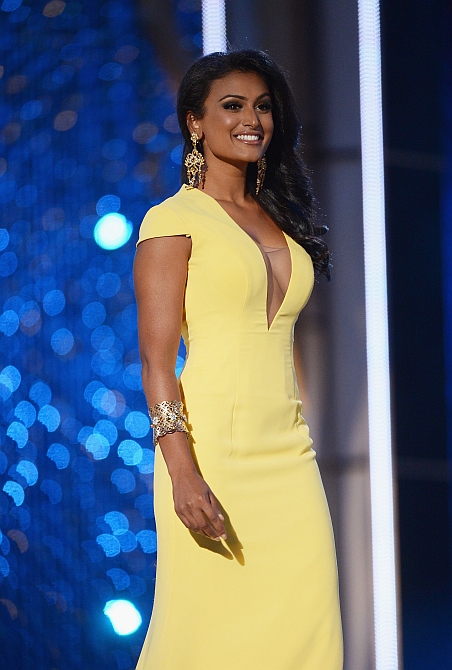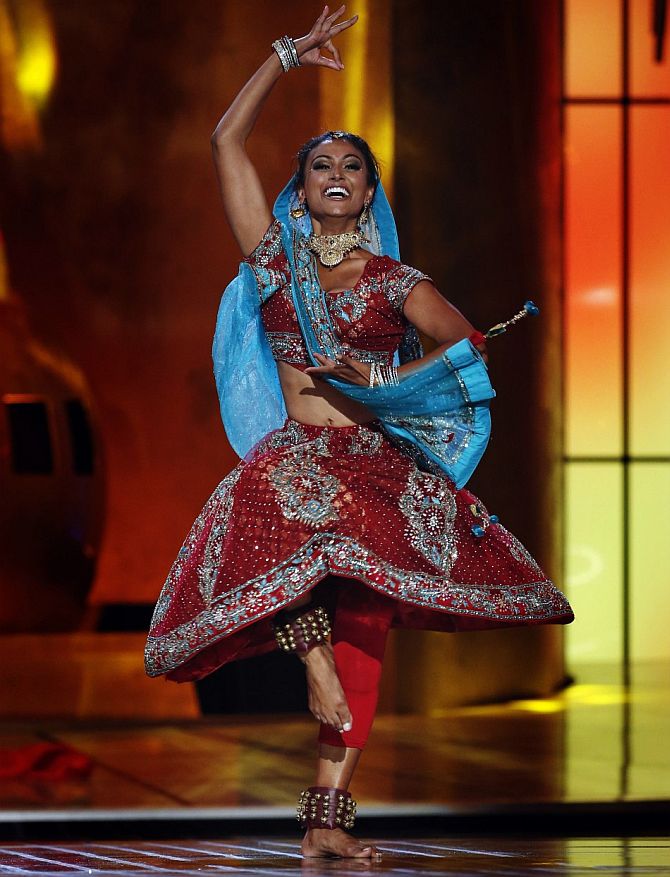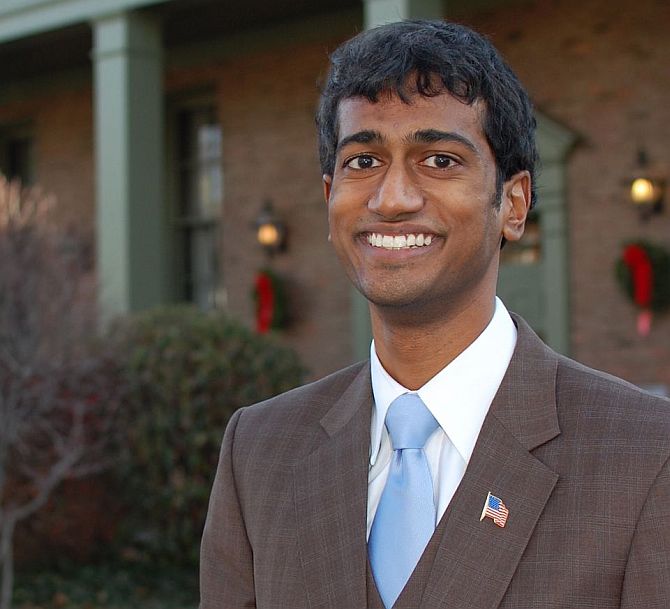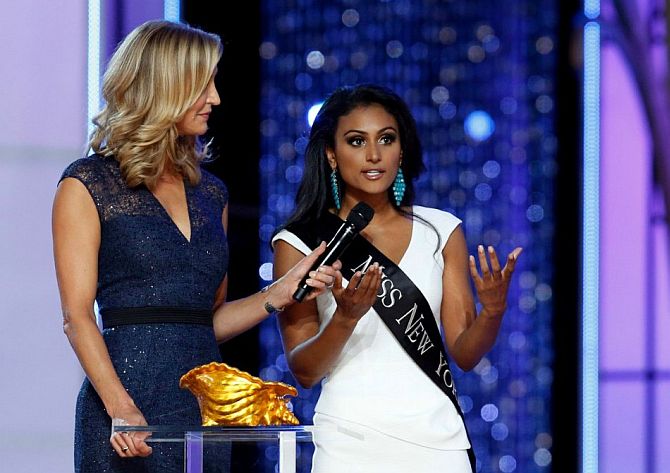Photographs: Lucas Jackson/Reuters Anna John
Amid the racist tweets and essays on how Miss America Nina Davuluri might ironically never have won a beauty pageant in India because of her colour, Sepia Mutiny blog co-founder Anna John points out the other angle that matters.
When I graduated from 6th grade, I transferred to a private school for junior high. My very insular class had been together since kindergarten and that meant I was a stranger -- and unwelcome. Cliques had been cemented years ago, so I spent two years feeling ostracised and miserable. Just as I was about to be free of my tormentors, they devised one last way to insult me.
Like many graduating classes do, we nominated people in categories like ‘Most Likely to Succeed,’ ‘Most Athletic,’ and ‘Most Likely to go to Stanford.’
Sadly, that last one wasn’t for me.
I still remember feeling bewildered after walking up to the wall where they had posted the faux-certificates. Every student’s name was on a piece of paper; we had all been nominated for something. I searched and searched and there, slightly off-centre, bottom row, was my name… under ‘Most Likely to be Miss America.’
I was perplexed. My classmates either loathed or ignored me. “Do they secretly think… I am pretty?” I murmured to myself, just before hearing fits of laughter. I turned around to see a boy and a girl from my class, who had snuck up on me.
“Did you hear her? She thinks she’s pretty. She’s ugly AND dumb.” That was my male classmate.
“Don’t you understand?” the girl said slowly, as if she were speaking to an idiot.
“We’re making fun of you. Miss America is white and pretty and popular. You’re black and ugly and no one likes you. IT’S A JOKE, weirdo.”
And with that, they left me alone to feel awful.
...
'Why I was electrified by Nina Davuluri's victory'
Photographs: Lucas Jackson/Reuters Anna John
I did not remember that brutal anecdote until this week, because I had blocked it out. But September 15, when those judges elevated Nina Davuluri, an Indian American who was pretty in a realistic way, who could have been the girl next door, (assuming I lived in a very diverse neighbourhood) to the position of Miss America that memory was summoned almost immediately.
Back then, it would have been life-altering if Miss America were Indian. In 1983, I was excited over Vanessa Williams winning and she had light skin and blue eyes! That’s how desperate I was for someone to integrate our collective definition of beauty.
It took 30 years, but Nina did just that. I’ve been ready to ditch ‘exotic’ for ‘All-American’ for quite some time now; it’s a relief to put down the henna, bindis, and mangoes.
There have been many articles about how Davuluri’s history-making win brought out the worst in racists who use Twitter. I should know, I wrote one on NPR and was quoted in several others. There have also been essays about how Davuluri would never succeed in colour-struck India, where even the darkest beauty queens are still several shades lighter than our new Miss America.
But the only story I didn’t see was the one about how it feels to look at your television and be electrified that the face beaming on stage resembles your own. That matters, too. Maybe it matters most.
...
'Why I was electrified by Nina Davuluri's victory'
Photographs: Lucas Jackson/Reuters Anna John
Dallas-area physician Christopher Blewett is married to another doctor, an Indian-American woman who, like Davuluri, is successful, dark-skinned, and of Telugu-descent.
They have two little girls, ages 5 and 7. He thought of his children when Davuluri won: “We all want to feel beautiful and worthwhile. We look at the world around us for validation. As silly as a beauty pageant may seem, it means the world to me that my daughters can look at Miss America and say ‘she is beautiful’ and ‘she looks like me.’”
We can argue that Miss America shouldn’t be celebrated, that we’d be better off explaining to our daughters why pageants objectify women, but to a 3 or 5 year old, most of that matters not. Many of them would prefer twirling in a sparkly tiara and a pretty dress to lectures about feminism.
For those little girls, seeing a high-profile face that resembles their own is a powerful thing. That’s the case for not-so-little girls, too. It’s nice to see desi people making inroads in unexpected territory.
...
'Why I was electrified by Nina Davuluri's victory'
Image: Surya YalamanchiliPhotographs: Courtesy Surya Yalamanchili Anna John
That was certainly true for Surya Yalamanchili, who was on season 6 of NBC’s Apprentice with Donald Trump.
In 2010 he was the Democratic Congressional nominee for Ohio’s 2nd District.
This is how he characterised the reactions his very public endeavours inspired: “I received some awesome messages from folks who were gratified that, not only was someone of South-Asian descent so publicly out there, but also that my last name was longer and my complexion darker, maybe, than what’s typically represented as South Asian.”
Indeed, there is a hunger to go beyond the way our community is ‘typically represented’ whether via Bollywood exports or the considerable success of India’s many beauty queens.
After co-founding and working on Sepia Mutiny for eight years, I met thousands of desi people all over the United States. None of them had Aishwarya Rai’s colouring. To be sure, there was a wide range of skin tones among the readers I met, but the majority of them were still darker than the “dusky beauties” that some Indians hold up to prove colourism doesn’t exist.
If Priyanka Chopra is considered ‘dark,’ then the multitude of mutineers I encountered were blacker than coal. But now? The once gaping chasm between a typical desi complexion and an ideal one has been narrowed greatly by Davuluri’s win. No wonder she inspires excitement, pride, and hope.
...
'Why I was electrified by Nina Davuluri's victory'
Image: Nina DavuluriPhotographs: Lucas Jackson/Reuters Anna John
In a poignant essay, entitled Growing Up Dark, activist Jasmine Thana revealed how our community’s preference for fair skin had harmed her, since almost everyone in her life belittled her for her complexion.
In response to the barrage of hurtful comments she endured as a child, Thana made a conscious effort to seek out positive images of dark skin. She had to look to the African-American community to find any. Then, last year, when she fulfilled a lifelong dream by moving to India, she realised that the biases she’d struggled against her whole life were waiting for her in her ancestral homeland, too.
“As a dark-skinned South Asian, my experience (in South India)… cut deeper than anything I knew in the US…I was surrounded by images of people who shared my ancestry, but never shared my complexion… my feelings about myself unconsciously became more and more negative.”
The language Thana uses to describe Davuluri casts the pageant winner as a rebel: “Nina’s presence is resistance to what is normally celebrated as beauty.”
Thana thinks Davuluri’s win is one that benefits many of us.
“Having a dark-skinned Miss America broadens the images of who is celebrated for their beauty. When only light-skinned, light-eyed people occupy public spaces of beauty, everyone who doesn’t embody those physical characteristics is not beautiful. As the new Miss America, Nina expands definitions of beauty to include not only her but all of us that don’t fit in that limited spectrum.”
Instead of focusing on racist tweets, alleged fat shaming, and conjecture regarding whether she’s “too Indian” to win anything in India, I choose to be grateful for this sudden, empowering feeling of inclusion.
Congratulations, Nina, and on behalf of a once-depressed eighth grader: Thank you.
Anna John was one of the co-founders of the blog Sepia Mutiny and a senior reporter at NPR, where she covered race, class, and culture. She currently serves as managing editor of StiffJab.com.






article